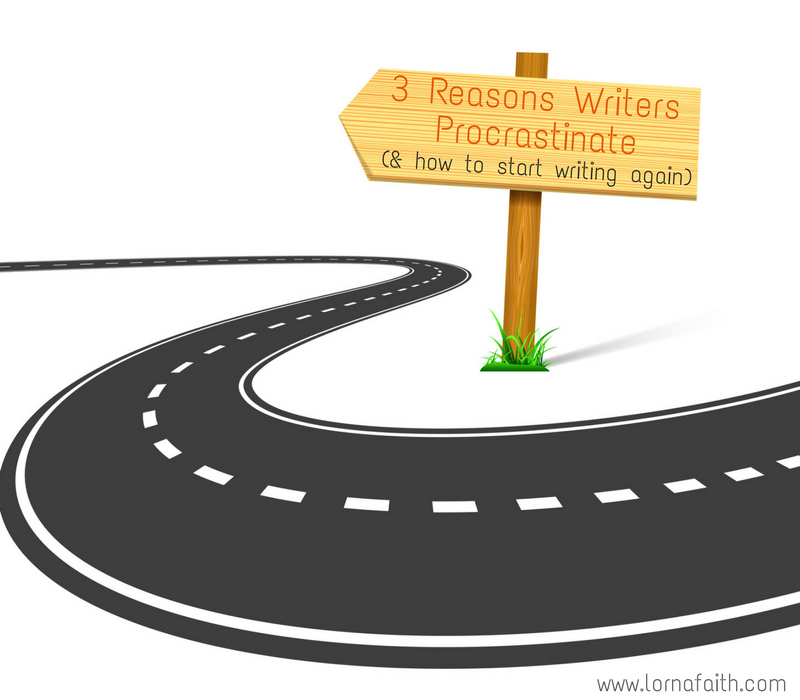Have you ever struggled with procrastination as a writer? What if you could begin today to stop procrastinating and finish writing your book?
The good news is you can. The bad news is… it takes focus and a bunch of effort to finish.
First what does it mean to procrastinate? Dictionary.com definition: to put off or defer an action until a later time; delay.
Basically, procrastination is putting off something that should be done now, until a later date. Which we all know is code for: when we feel like it. Problem is, sometimes the day when we feel like writing and finishing the book, never comes.
Sounds like a feeling I’m very familiar with… and it also sounds like a recipe for disaster.
Many writers I’ve talked with, have also struggled with procrastination at one time or another.
So how do each of us as writers, stop this common self-sabotaging cycle? Read on for some thoughts on some big reasons why writers procrastinate and what we can do about it…

3 Reasons Writers Procrastinate
You have a story you really want to tell with interesting characters and setting or you might have an inspirational or educational nonfiction book that you want to write… but somehow you’re stuck. Maybe you can’t seem to get motivated to finish writing your book.
Don’t worry, you’re not alone. Most writers(including me) have many moments of feeling stalled or stuck as they work on their books. The reasons for procrastinating are many, but I’ll mention three below as well as three tips on getting past procrastination.
1.Worrying that your writing isn’t any good.
Most writers I know struggle with this one. Here’s something I’ve realized: Even bestselling authors struggle with writer’s doubt. All writer’s worry ask some version of this question: is my writing good enough?
Tips on how to stop worrying about your writing:
- Do your best to stop being so hard on yourself. Take comfort knowing that you’re not alone. On some level all writers are worried if their writing is good enough. When you start giving yourself creative freedom(and freedom to make mistakes) you’ll be amazed at how your inspiration and motivation to begin writing your story comes back again.
- Try to uncover the real reasons you’re not writing. Is it intimidation; is it fear of sharing your real story/emotions on the page; are you worried you’ll be rejected by family or friends once your story is out there? Whatever is holding you back, write down a list of fears or the challenges that are stopping you from realizing your dream of writing.
2.Too much mystery on what to write each day(aka… not enough planning).
I started out ‘winging it’ when I wrote my first novel and it took me years to get it written. So, I changed how I did things for book 2 in my Historical Romance series. I created an outline. It was super helpful(even though I didn’t completely stick to it). I cut my writing time in half, just because I took the time to pre-plan.
When there is too much ‘mystery’ about what you’re writing or where your story is headed(where’s it going to end?), then it’s really tough to be motivated to sit down to write each day.
Tips on how to take the mystery out of your writing process each day:
- Take an hour or half a day to write down a short summary of where you’re story is going. Even if you don’t write a complete outline, just having a good idea of the first three chapters and how your story will end, will be super helpful.
- Also, before you end a writing session each day, take 5 minutes and write down a summary/description of the scene or chapter you’ll write the next day. This has been a game-changer for me. When I write out a quick summary and take a minute to visualize the next part of the story I’ll be writing, it not only helps to get clear on the story, but it also makes me excited to write!
3.Setting unrealistic expectations or goals for your writing.
When you dream of writing and publishing your book, it’s possible that you might set unrealistic expectations for your writing goals… especially when you’re first starting out.
When you focus on goals that are ‘far away’ or daily goals that are too large, it can take away any desire to write. You might even feel overwhelmed just thinking about all those words you need to write to reach your goals.
Tips on how to set do-able writing goals and expectations everyday:
- Instead, break down your writing goals into small-ish chunks. Write only one scene a day, or only 500 words a day. Start with small goals instead of huge mountains. That way you’ll feel motivated and inspired to write.
- Also, if you struggle to focus(like I do…) use a count down timer and focus only on writing until the 10 minute timer beeps.
- One last tip, don’t worry about what your words or sentences look like. When you’re writing a first draft, do your best to avoid editing and just write. Really… this will save you tons of time.
So I hope these tips are helpful to you.
Procrastinating on writing, is something I’ve struggled with a lot. These are steps I’m still working through.
One way I’m learning to get past this huge ‘procrastination cycle’ is by researching(and using myself as the guinea pig… so to speak). That’s why I’ve been writing – in stealth mode – a book called Finish Your Book. My passion is to help other writers who also struggle to finish their book.
So as promised, here are the names of the randomly picked, 3 winners of Finish Your Book eBook when it’s finished): Sherryl, Brenda and Lisbeth. I will send you a note(hopefully I have the right email address ;). Thanks so much everyone for joining in the fun, and I really hope you find the book helpful.
Do you struggle with procrastination? I’d love to hear your thoughts in the comments on what you do to get past procrastination to write 😉

 In the update I share about a great summer with family!
In the update I share about a great summer with family!


